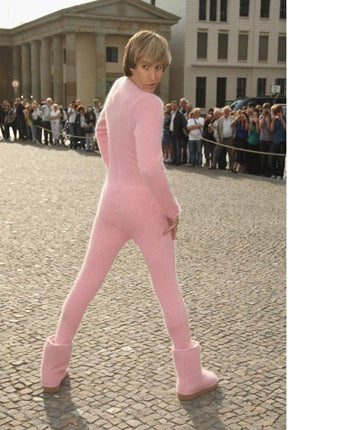Peter Tatchell: 'Brüno will both incite homophobia and make bigots squirm'

Your support helps us to tell the story
From reproductive rights to climate change to Big Tech, The Independent is on the ground when the story is developing. Whether it's investigating the financials of Elon Musk's pro-Trump PAC or producing our latest documentary, 'The A Word', which shines a light on the American women fighting for reproductive rights, we know how important it is to parse out the facts from the messaging.
At such a critical moment in US history, we need reporters on the ground. Your donation allows us to keep sending journalists to speak to both sides of the story.
The Independent is trusted by Americans across the entire political spectrum. And unlike many other quality news outlets, we choose not to lock Americans out of our reporting and analysis with paywalls. We believe quality journalism should be available to everyone, paid for by those who can afford it.
Your support makes all the difference.Sacha Baron Cohen's movie Borat was a masterpiece of comedy; arguably the most inventive satire for many years. Its unique genre of wicked, sophisticated parody set the bar very high; so high that Cohen's latest comedic outing, Brüno, is something of a letdown. After all the hype, I feel cheated.
While the film scores plenty of laughs by mercilessly exposing dim-witted homophobes, Brüno's persona also embodies some really lazy, crude gay stereotypes. A sex-obsessed "cockaholic", he is a shallow bitchy queen who uses and abuses everyone around him. Not nice.
On the plus side, ultra-gay Brüno will make many bigoted straight people feel uncomfortable, a delicious prospect. But quite a few gay men watching this movie may also squirm.
Does Brüno reinforce or undermine homophobia? I am not sure. If Cohen's intention was to mock prejudice, this film doesn't always pull off the money shot. Compared to Borat, it's more hit and miss.
As a spoof on the fashion industry, homophobia and fame-hungry wannabes, the movie had immense potential. But the end product lacks the consistent, spot-on, intelligent, high-class wit we expect from Baron Cohen. It relies too much for its laughs on sexually explicit shock and awe, with endless gobsmacking images of penises, dildos, bondage and group sex; plus arse waxing and anal bleaching. Funny, but crude.
As most of us know from the film's pre-publicity, Brüno is an outrageously gay fashion reporter from Vienna who wants to be "the biggest Austrian superstar since Adolf Hitler". His route to stardom is, thankfully, more mein camp than Mein Kampf.
After he gets blacklisted in his homeland for his tasteless fame-hungry antics, Brüno travels to the US in a vainglorious bid to hit the big-time. The film follows his many misadventures, including a plan to butch up by joining an army training camp and his hilarious attempt to seduce the pro-family values congressman Ron Paul.
Parodying Madonna, Brüno goes to Africa where he exchanges his iPod for a black baby. He christens him OJ. Dressing him in a T-shirt emblazoned with the word "Gayby," he parades him on a TV chat show, describing his child as a "dick magnet" and showing photos of himself and baby in a gay hot-tub orgy, to the (justifiable) outrage of the studio audience.
In another scene, Brüno seeks advice on overcoming his homosexuality from a former gay man turned Christian cure therapist. There is a brilliant tense moment when he compliments the therapist on his gorgeous blow-job lips, which evokes a quivering, panicked response from this supposedly "cured" ex-gay.
The cage fighting scene is also tops. The stadium crowd eggs-on the two protagonists to beat the hell out of each other, but goes berserk with homophobic rage when they start kissing and fondling each other instead. This clip cleverly exposes the moral sickness of machismo, where violence between men is cool, but passion is not.
The movie rolls back the boundaries, with its raw portrayals of gay sexuality. Some might say that this honesty and debunking of taboos is refreshing and ground-breaking. But do these no-holds-barred erotic depictions advance or reverse public acceptance of queer life?
Surely no cinema can be so influential that it sways public opinion for or against prejudice? It is only a film. Moreover, it is a comedy, not intended to be taken seriously. Fair point. But although it may not create homophobia, perhaps it can reinforce and inflame it? Go see Brüno. You decide.
Peter Tatchell is a human rights campaigner. This is an edited extract from a longer article that appears in the July issue of 'Attitude' magazine
Join our commenting forum
Join thought-provoking conversations, follow other Independent readers and see their replies
Comments